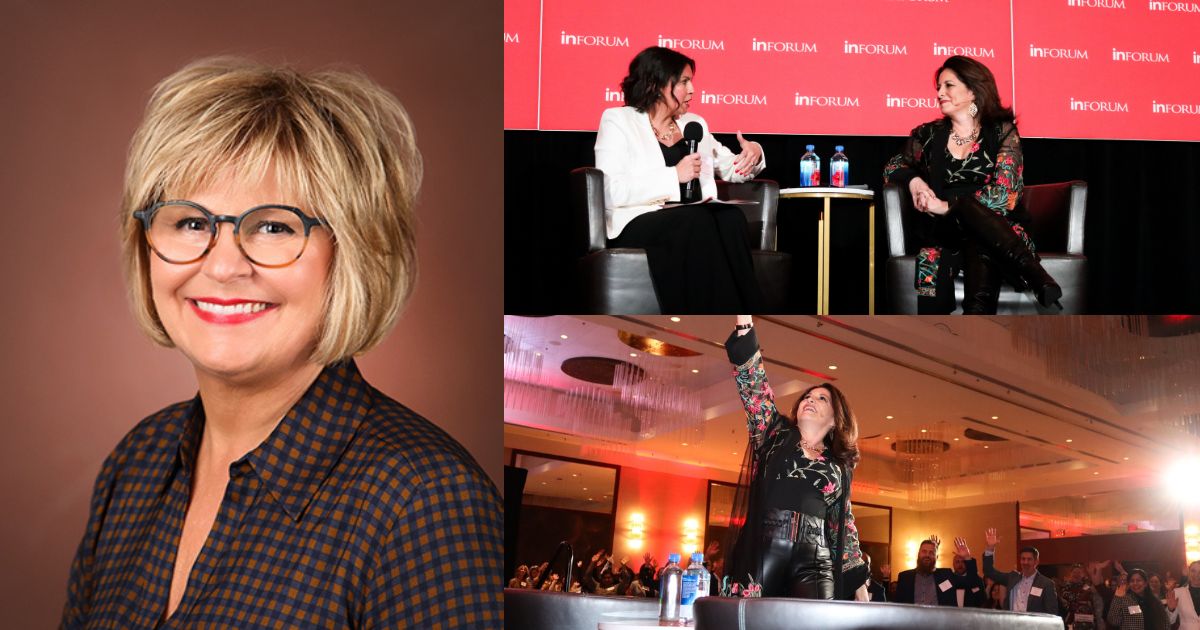Do you ever find it hard to speak up for yourself? I think most of us have, and it certainly has been true for me.
The power of self-advocacy was the theme of our annual Capstone Dinner, which is the highlight of the Inforum program year in West Michigan.
This event, which draws more than 500 people, is always a source of inspiration. Our speakers have included Tarana Burke, founder of the MeToo movement; Sarah Thomas, the NFL’s first woman full-time official; and mental health expert Dr. Dominique Pritchett, as well as many compelling local speakers, and my knowledge and awareness have grown through all of them.
This year, our West Michigan Regional Council chose Ilhiana Rojas Saldana, who has over 20 years of global executive experience in Fortune 500 companies in Mexico and the U.S., leading and coaching professionals and businesses to success. She was joined on stage by Maria Zambrano Curtis, Director of Manufacturing operations for Meijer.
Ilhiana is a chemical engineer who transitioned to a series of fast-track positions in marketing for a global company and 10 years in was promoted to an executive position. And yet, over the next five years, she lost her confidence and her voice. Perfectionism and imposter syndrome took over her professional life. Her inner critic was rarely silent.
Ultimately, she left the corporate world and took time to reconnect with herself. What she realized was that self-doubt is common across many levels of title and achievement. People find it hard to put themselves forward.
But, as Ilhiana reminded us, “The reality is that in those moments of silence, we’re allowing others to control the narrative. We are losing our voice and giving away our power and allowing others to choose where our path will follow.”
And that’s why we need our voice: Self-advocacy creates visibility, which creates credibility, which creates opportunity.
So, what’s the answer? Here is some of what we learned.
Embrace your zone of genius.
Shift your mindset from self-centered to impact-centered. You do this by reframing your strengths as an act of contribution. Share your value.
What are your superpowers? What do you stand for and what do you want to stand for? By defining them, you can claim your superpowers and be able to offer help to others. Ilhiana’s superpowers are maximizer, strategist, and connector. What are yours? If you aren’t sure, ask others what words they would use about you as a place to start.
Elevate your voice to create visibility.
This sounds hard to many of us, but it is harder to add value if we don’t. As Ilhiana put it: “You’re all amazing, but if nobody knows that, then you’re the world’s best-kept secret.”
It’s OK to start small, but consistency is key. For example, speak at all meetings—ask a question, amplify another’s voice, and make your individual contribution. That means being prepared. Think every day and before you start the day about the one bold thing you will do to put yourself out there.
Other strategies:
- Take advantage of casual opportunities. Say a quick hello to people you know at gatherings and move on to talk to people you don’t know.
- Celebrate accomplishments—yours. This can be hard, but one strategy is to recruit a “bragging partner” so that you can highlight each other.
- Participate in high-visibility activities. Also hard, but it’s necessary to carve out a space every week or every other week. It can be as little as 30 minutes. Possibilities: Participate in projects, initiatives, and spaces outside of your area of influence. Pursue speaking opportunities. It doesn’t have to be on a stage, but present something to someone at least once a week.
- Leverage social media. We live in a digital world. Update your LinkedIn. Stay active.
Make three lists.
Success is very hard to achieve alone—it’s easier if you have others. Here’s who you need:
- People in your network that you have a strong relationship with. They can help you reach short-term goals (6-12 months). They can be the echo of your voice.
- People you know but don’t have a relationship with. They can help with two- to three-year goals. These are senior leaders who are making decisions, future partners, and people you need to know to close a deal down the line. Be patient: It will take two or three years to build many of these.
- People you should know. These are people who can help you with your goals 5-7 years down the line. Who could those people potentially be? How can you create and build a relationship? The first step can be small. Ilhiana met a future business partner by sending a LinkedIn message.
This can all feel daunting, but one of my important takeaways was that effectively advocating for yourself starts with small steps that you can build into your daily life.
I also know that Inforum can help. We offer many opportunities for women and men—individually and inside companies—to build internal and external networks, learn and practice new skills, and bring their expertise and authentic selves forward with confidence.
Want to know more? You can view Ilhiana’s presentation here.
Becky Wood is vice president of business development and West Michigan market leader for Inforum, whose nonprofit mission is to help women lead and succeed in the workplace and companies build their talent pipelines.
Courtesy of Inforum.
Photo coutesy of Created With Bri.




